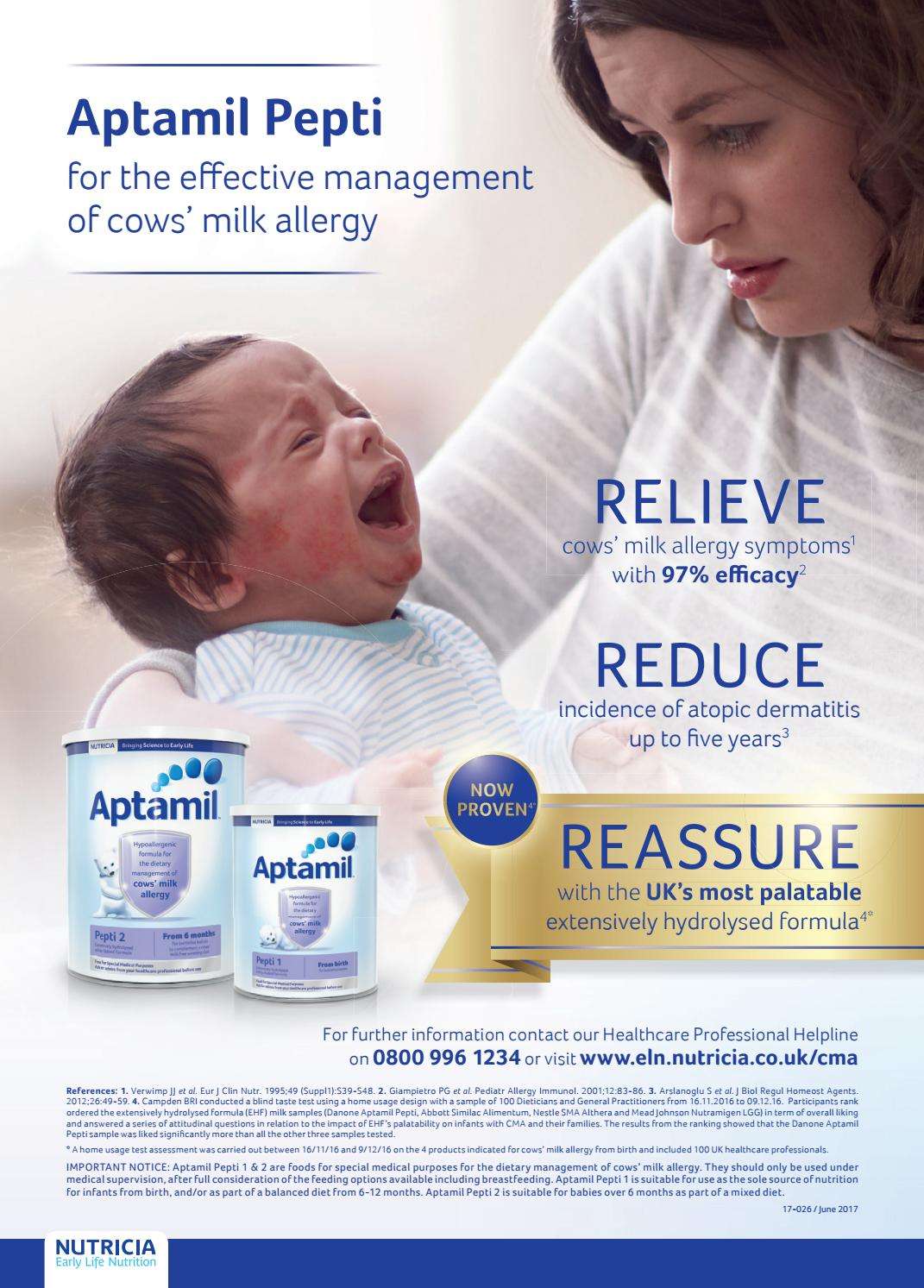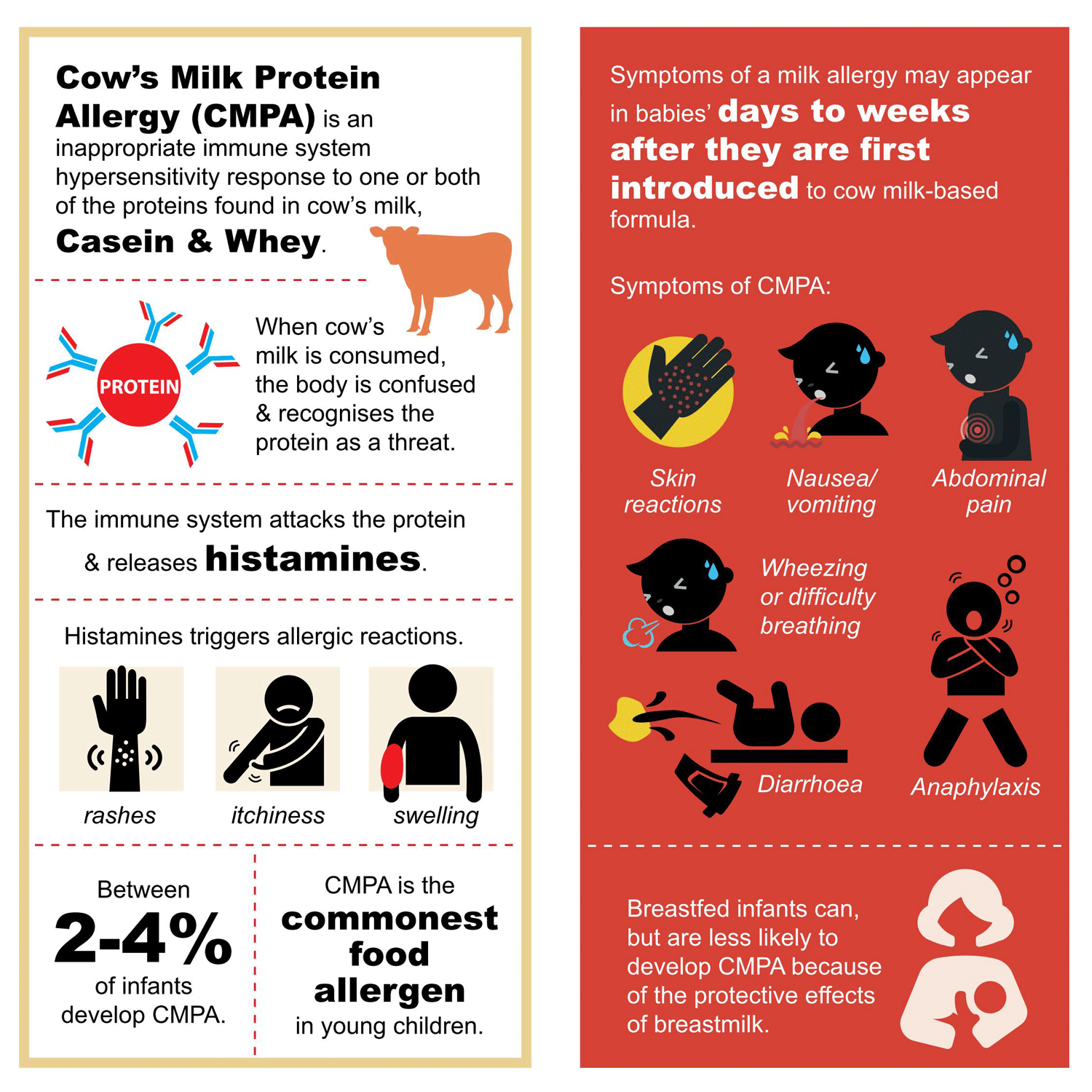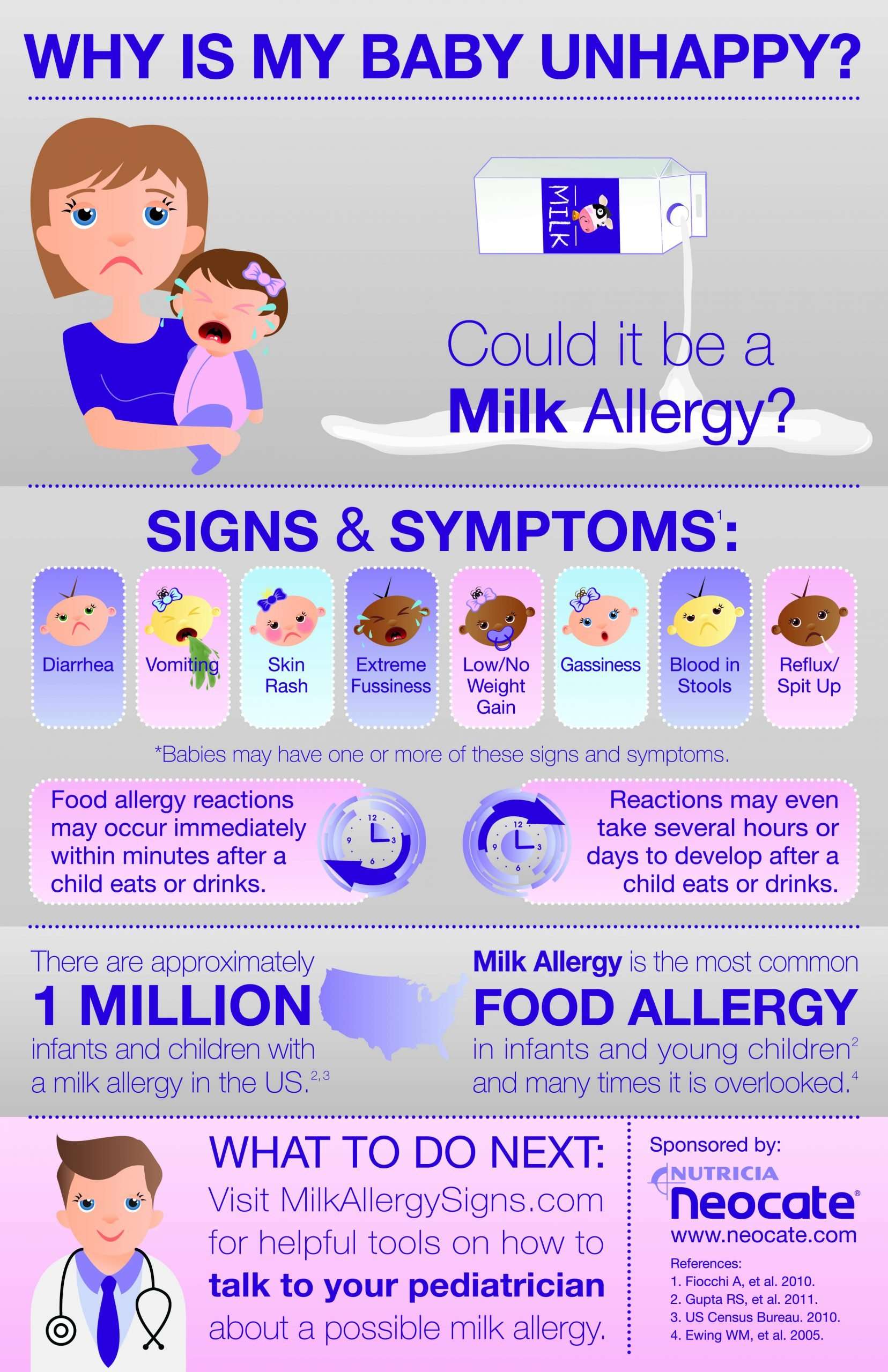Alternative Milks For Babies
Soy protein formula
- Tolerated by most babies with cow’s milk allergy.
- Unsuitable for babies allergic to soy.
- Usually only recommended in babies over six months old.
Cows milk based extensively hydrolysed formula
- EHF has been treated with enzymes to break down most of the cows milk proteins and it is usually the formula of first choice in cows milk allergic babies.
- EHF is not suitable for babies who have had anaphylaxis to cows milk.
- Some EHF brands are available without prescription.
- An amino acid based formula is usually prescribed if a baby reacts to EHF.
- Partially hydrolysed formula is not a suitable formula for babies with cows milk allergy as enough allergenic protein is usually present to trigger an allergic reaction.
Rice protein basedformula
- May be used as an alternative formula to EHF or soy protein formula and continued or changed based on specialist advice.
- Available without prescription.
- Should not be used in babies with food protein induced enterocolitis syndrome to rice.
Amino acid based formula
- AAF is necessary in around one in ten babies with cow’s milk allergy.
- AAF is usually prescribed when an EHF or soy protein formula is not tolerated.
- AAF is tolerated by most babies with cow’s milk and soy allergies.
A Child Fed With Cow’s Milk Formula With Mild
Figure 2
In infants with immediate symptoms or late symptoms , constipation) a CMPA can be suspected . Other causes are to be considered for patients unresponsive to treatment. Infant colic is not unanimously considered as a consequence of CMPA. The paediatrician has to consider the opportunity of a cow’s milk free diet in the most troublesome cases . Mild immediate reactions may be of difficult interpretation because they can be the result of causes different from CMPA. However, if these symptoms are strongly related to cow’s milk ingestion, we recommend to eliminate cow’s milk and follow the algorithm for severe reactions .
Regarding delayed onset gastrointestinal symptoms, other pathologies should be excluded before investigating allergic sensitization.
In mild atopic dermatitis, investigations for CMPA are not necessary in the absence of a clear relation between cow’s milk intake and onset of symptoms.
When a CMPA is suspected, infants should go on a 2-4 week diet without cow’s milk protein. Four weeks should be considered for chronic gastrointestinal symptoms. Infants should be fed with eHF or SF in children aged more than 6 months and without gastrointestinal symptoms.
When there is strong suspicion of IgE-mediated reactions, in infants who do not respond to a diet with eHF or SF an attempt may be made with a 14-days diet with AAF.
How Do I Introduce Milk To My Baby With A Milk Allergy
Most children with milk allergy will outgrow the problem. It has been shown that many children who react to fresh milk, cheese and yoghurt may tolerate milk in a cooked or baked form. Cooking or baking milk, especially when mixed with flour and other foods makes the milk less likely to cause allergic reactions.
Read Also: Dextromethorphan Allergy
Treatment With A Dairy
If you do need to eliminate dairy, there are many substitutes for cow’s milk and milk products available. Just look for dairy-free on the labels at the grocery store. Since milk is a known allergen, it must be identified on food labels. Remember that milk can be found in many different products, including soups, salad dressing, and baked goods.
Keep in mind that even though a reaction to cow’s milk is the more common one, soy and nuts can also cause allergies in breastfed babies. Also, you’ll need to be careful that you consume enough calcium from non-dairy sources in order to meet your nutritional needs.
What Causes Cows Milk Protein Allergy

Like other allergic reactions, a cows milk protein allergy is caused by an immune system reaction to the proteins found in cows milk, dairy products made from cows milk, and even products that use cows milk protein ingredients like casein. The immune system proteins in cows milk as a harmful invader, triggering the release of histamine.1
You May Like: Rubber Accelerators Allergy
What Are The Signs & Symptoms Of A Milk Allergy
In children who show symptoms shortly after they have milk, an allergic reaction can cause:
- wheezing
- swelling
- a drop in blood pressure causing lightheadedness or loss of consciousness
The severity of allergic reactions to milk can vary. The same child can react differently with each exposure. This means that even though one reaction was mild, the next could be more severe and even life-threatening.
Children also can have:
- an intolerance to milk in which symptoms such as loose stools, blood in the stool, refusal to eat, or irritability or colic appear hours to days later
- lactose intolerance, which is when the body has trouble digesting milk
If you’re not sure if your child has an intolerance versus an allergy, talk to your doctor.
Cow’s Milk Protein Allergy
In this series
Cow’s milk protein allergy is one of the most common food allergies seen in children. It is most commonly seen during the first year of life. Many children who have been allergic to cow’s milk protein become tolerant to it by the time they are 5 years old.
In this article
You May Like: Clariton
What Causes Cows Milk Allergy
An allergy happens when the body’s immune system mistakes a harmless substance — in the case of food, a protein — as a foreign invader and attacks it, much like it would attack bacteria or a virus. This abnormal response releases chemicals that in turn trigger the symptoms associated with an allergy.
Milk contains both casein and whey , and each of these has several different proteins, any of which can cause an allergic response.
A cows’ milk protein allergy can cause different kinds of reactions, depending on the chemicals released, and the allergy is categorized based on these causes:
- Immunoglobulin E -mediated reactions: The immune system releases histamine and other chemicals in response to cows’ milk protein. The symptoms usually occur within 20 to 30 minutes of consuming the protein, but they can appear up to 2 hours later.
- Non-immunoglobulin E-mediated reactions: T cells are thought to be the trigger for the symptoms, which appear more gradually, from 48 hours up to a week after consuming cows’ milk protein.
- Mixed IgE and non-IgE reactions: This is a combination of immunoglobulin E-mediated reactions and non-immunoglobulin E-mediated reactions.
A cows milk allergy should not be confused with lactose intolerance, a condition in which the body cannot produce enough of the enzyme needed to digest a type of sugar found in milk.
Continued
How Do I Cut Dairy Out Of Babys Diet
Cows milk protein is passed to babies through breast milk, so the only way to eliminate it from babys diet is to eliminate it from moms diet. This means more than just cutting out milk and cheese it means looking at every single food label before consuming and making sure it doesnt have any hidden dairy ingredients. This can be difficult, but so worth it if you can make your little one feel better!
If youre formula feeding, youll want to try formulas that have broken down milk protein. Soy-based formulas might seem like a good choice, but 8 to 14 percent of infants with cows milk allergy will also react to soy.3 While its not the cheapest option, hypoallergenic formula is a great place to start. Similac Alimentum breaks casein into smaller, more digestible pieces.
Recommended Reading: Allergy Medication Non Drowsy
Understanding Milk Protein Allergies In Infants
A milk protein allergy most often happens in babies who are fed cows milk formula. This occurs when the bodys immune system perceives cows milk protein as harmful and causes an allergic response.
According to a 2016 study published in the British Journal of General Practice, up to 7 percent of babies who are formula-fed are allergic to cows milk protein.
In some cases, though, it can occur in breastfed babies. According to the same 2016 study, up to 1 percent of babies who are breastfed develop an allergy to cows milk.
Certain genes have been identified in milk protein allergy. Up to 8 out of 10 children will outgrow the allergy by age 16 years, according to the American College of Allergy, Asthma, and Immunology.
How Is Cmpa Diagnosed
If a cows milk allergy is suspected, diagnostic tests include a blood test, skin prick test, or a patch test, as well as an elimination diet paired with a food challenge. If your baby is displaying any symptoms of CMPA, it is important to get tested as the long-term effects of undiagnosed cows milk protein allergy in infants can affect a childs growth and development by increasing their risk of stunted growth, rickets , anemia, malnutrition, undeveloped bones, asthma, colic, and acid reflux.
Also Check: Robitussin Cough Suppressant And Expectorant
Identifying Infant Milk Allergy
Be sure to have your child evaluated by their pediatrician and/or an allergy specialist to ensure your child actually has a milk protein allergy. This is especially important because while 1% of babies have a true milk allergy, upwards of 14% of parents falsely assume their babies have this issue.
This often unsubstantiated worry that the mother’s milk is making their child ill can erode breastfeeding confidence and/or causes a huge, unnecessary disruption in the parent/infant diet.
According to researchers in a 2020 study, “Clinical trials do not provide consistent support for using maternal or infant cows milk exclusion to manage common symptoms in infants without proven CMA. We estimated that for more than 99% of infants with proven CMA, the breastmilk of a cows milkconsuming woman contains insufficient milk allergen to trigger an allergic reaction.”
So, don’t stop breastfeeding because of a suspected or confirmed allergy to cow’s milk protein, unless instructed to do so by your doctor. In fact, as mentioned above, even if your baby does have a milk allergy, you can usually still consume dairy and continue breastfeeding.
Once you eliminate these foods, you may see improvement in as little as a few days. But it can take two to three weeks to see results.
How Do I Know If My Baby Has A Cows Milk Protein Allergy

The symptoms above are good signs of CMPA, but there are blood tests, diaper tests and skin prick tests that can be done to officially identify the allergy. That said, these tests can be rough on babies, and many pediatricians just recommend cutting dairy out of the babys diet to see if baby gets better. This sounds simple, but can be difficult for breastfeeding moms, and can also take weeks to identify.
Also Check: Loratadine Allergic Reactions
Is Breastfeeding Safe In Babies With Cma
You can continue to breastfeed infants with CMA. Breastfeeding alone is the best source of nutrition for all babies until the age of 6 months. For babies older than 6 months, you need to slowly introduce solids because breastfeeding alone is not enough for growth and development. If possible, babies should continue to be breastfed until they are at least 12 months of age. For babies that are breastfed only, mothers should continue breastfeeding. Many women can continue to have cows milk or dairy in their own diet without affecting the baby, but some women will also need to avoid but must avoid any foods or drinks that contain cows’ milk products or dairy. Your doctor or dietitian can help make this decision. Mothers who are avoiding dairy may need help to make sure they are getting enough calcium.
If this does not resolve symptoms, or if breastfeeding is not possible or adequate, or if you wish to wean your infant before they are aged 12 months, ask your doctor or dietitian for advice on which infant formula to try.
Not All Reactions To Cows Milk Are Due To Allergy To Cows Milk Protein
Lactose intolerance: This is caused by the lack of the enzyme lactase, which helps to digest the milk sugar called lactose. Symptoms include diarrhoea, vomiting, stomach pain and gas . This condition is uncomfortable but not dangerous and does not cause rashes or anaphylaxis. Allergy tests to cows milk are negative in people with lactose intolerance. Diagnosis is by temporary elimination of lactose and reintroduction.
Milk, mucus and cough: Some people complain that when they drink cows milk or eat other dairy foods, that their throat feels coated and mucus is thicker and harder to swallow. Research has shown that these sensations occur with similar liquids of the same thickness and are not due to increased production of mucus.
Read Also: Zyrtec For Skin Allergies
How To Spot A Cows Milk Protein Allergy
Everyone knows that milk is the best source of nutrition for growing babies but what about when its not?
If your infant is extra fussy after eating, is having digestive issues like diarrhea or constipation, or is spitting up a lot, they may have something called a cows milk protein allergy . Although the name of this includes, “allergy,” it acts more like an intolerance and it’s important to note that this is very different from a cow’s milk allergy, which can be serious and cause anaphylaxis. As a pediatrician, I would work closely with the Children’s Wisconsin Allergy and Clinical Immunology Department for a cow’s milk allergy, but that isn’t always necessary with CMPA.
This blog is going to help explain CMPA, not a cow’s milk allergy.
If your child has CMPA, know that most babies typically outgrow it.
As a pediatrician, not only do I see patients with CMPA, but it impacted my own family. My daughter had blood in her diaper at 6 weeks old, and of course, we were alarmed. However, I had a feeling that whatever was wrong would explain her fussiness and severe spit up over the previous month. A simple test helped confirm CMPA, and after two weeks of eliminating dairy from my daughter and wife’s diet, the spit up was nearly gone and her stools were completely normal.
Cows Milk Allergy Is Uncommon
According to a special communication published in JAMA Pediatrics, while 14% of babies are reported to have cows milk allergy, only about 1% actually do have it.
As for the diet restrictions for breastfeeding mothers, the authors report that those are likely not necessary, even if there is an IgE-mediated allergy. So many mothers are putting their nutrition at risk, or stopping breastfeeding, for no good reason.
Its also worrisome that in 81% of the published guidelines on cows milk allergy, the authors of the guidelines reported a conflict of interest with formula manufacturers. This does not mean that the guidelines arent good or accurate, but its troubling that the formula manufacturers are supporting so much of the research.
If your baby has been diagnosed with cows milk allergy, and you have changed your babys diet or your own, dont stop these changes without talking to your childs doctor. But definitely talk to the doctor, and be sure that you understand exactly why your baby has the diagnosis and whether any further evaluation makes sense.
Follow me on Twitter @drClaire
Also Check: Fexofenadine Hcl Vs Cetirizine Hcl
Negative Challenge: No Cmpa
Children who do not develop symptoms on the cow’s milk formula during challenge and up to 1week after followup can resume their normal diet, although they should be monitored. Clinicians should advise parents to be attentive for delayed reactions, which may evolve over several days following the challenge.
Symptoms Of Cows’ Milk Allergy
Cows’ milk allergy can cause a wide range of symptoms, including:
- skin reactions such as a red itchy rash or swelling of the lips, face and around the eyes
- digestive problems such as stomach ache, vomiting, colic, diarrhoea or constipation
- hay fever-like symptoms such as a runny or blocked nose
- eczema that does not improve with treatment
Occasionally CMA can cause severe allergic symptoms that come on suddenly, such as swelling in the mouth or throat, wheezing, cough, shortness of breath, and difficult, noisy breathing.
A severe allergic reaction, or anaphylaxis, is a medical emergency call 999 or go immediately to your local hospital A& E department.
Don’t Miss: Can Allergies Cause Swollen Glands
What Is A Food Allergy
First things first, what is a food allergy and how does the body react when an allergen is ingested? In short, a food allergy is when the bodys immune system responds abnormally to the protein in a certain food that is otherwise harmless. This results in an allergic reaction ranging from a rash to anaphylaxis, the latter of which can be life-threatening.
The most common food allergens include:
- Peanuts
- Sulphites
- Milk
Regardless of the type of food allergy, there are two different immune reactions that can occur in the body in response to an allergen:
Cows Milk Protein Allergy In Infants

Medically reviewed by Abbey Sharp, Registered Dietitian , BASc.
We explore the research on Cows Milk Protein Allergy in infants, its symptoms, risk factors, and treatment options as well as if breastfeeding moms need to go dairy-free.
Food allergies affect up to 10% of infants and the prevalence of allergies in children continues to be on the rise. Cows Milk Protein Allergy is among the most common allergies found in babies and is diagnosed in 2 to 6% of children, primarily in infants under the age of one. In this blog post we deep dive into all things CMPA and break down the common symptoms, risk factors, diagnostic tests, treatment options, and whether or not you need to go dairy-free.
Read Also: Twix Allergens

